Adrian Collins's Blog
November 20, 2025
REVIEW: Kingdoms of Death by Christopher Ruocchio
Christopher Ruocchio’s Kingdoms of Death, book four of The Sun Eater flips the series on its head. What if Hadrian is wrong about being able to negotiate with the Cielcin? What if his new found powers were used against him? What if there’s another chose one? Startlingly bleak, full of torture, and gorgeous prose interlining the book like silver thread, Kingdoms of Death moves beyond simple darkness and into the black, cold void of space.
“I had defied the Prince of Princes, and all would see the consequences of that defiance.”
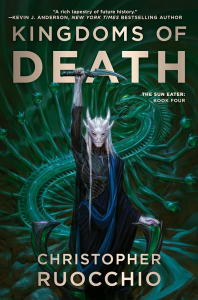 Kingdoms of Death is absolutely brutal. Not in the military way of armies and blood (although, we do have that here), but in the way of scalpels and starvation. Most of this book revolves around the trapped Hadrian being tormented and dialoguing with his tormentors. As a premise, it sounds both boring and vulgar, but it works shockingly well. Hadrian and the leader of his captors have dialogue exchanges that I could have read hundreds of pages of, and Ruocchio’s prose keeps everything sharp and compulsively readable.
Kingdoms of Death is absolutely brutal. Not in the military way of armies and blood (although, we do have that here), but in the way of scalpels and starvation. Most of this book revolves around the trapped Hadrian being tormented and dialoguing with his tormentors. As a premise, it sounds both boring and vulgar, but it works shockingly well. Hadrian and the leader of his captors have dialogue exchanges that I could have read hundreds of pages of, and Ruocchio’s prose keeps everything sharp and compulsively readable.
Instead of battle and victory, Kingdoms of Death is suffering and defeat. Pain and torment. Anguish. Misery. To some, that will be off-putting, but there is beauty in the wretchedness. Hadrian’s relentless will to live is equal parts inspiring and tragic. The themes of survival and grief sharpened to a fine point. A plot meticulously crafted. Kingdoms of Death is a big success in what it seeks to do.
What surprised the most about Kingdoms of Death is the improvement in Ruochioo’s prose. He’s always been in the upper echelon, but the way his pen weaves, shines, and darkens, it can only be compared to silver or moonlight. It’s beautiful stuff, even though the book is pretty relentlessly dark.
This is the shortest book in The Sun Eater, and it’s also its most profound. It’s quiet, it’s grief heavy, it’s the silent step at night. The character study of Hadrian has changed direction and grown even more, and the thematic work is genius. Ruocchio is breathing rarefied air here.
Finally, what’s so impressive in Kingdoms of Death is its ability to make you feel. By the end, you’ve had your heart broken and your anger stirred to a full on maelstrom. That’s the mark of a truly great book, and a truly great cast of characters.
“We are all shaped by our suffering. That we are only what we are is ever our chiefest sin.”
Kingdoms of Death is a great book, but I did have a small critique of the ending. Originally, Ruochhio intended for both Kingdoms of Death and Ashes of Man to be one book. It grew too large, and as a result, he had to split them into two tales. While Kingdoms of Death is a complete tale, the tonal shift from 75% on felt a bit sudden, but we’re also not given enough time to fully be immersed in the switch.
It’s a small critique, and for Sun Eater fans who have been hoping Ruocchio goes just a bit darker, the prose gets even better, and the characters even more nuanced, making this is a home run. Kingdoms of Death is not the roaring applause and rousing victory of Demon in White, it’s the whisper in the night. Horrifying, bleak, gloomy, and melancholic, Kingdoms of Death is a treat for sci-fi, Sun Eater, and grimdark fans alike.
Read Kingdoms of Death by Christopher RuocchioThe post REVIEW: Kingdoms of Death by Christopher Ruocchio appeared first on Grimdark Magazine.
November 19, 2025
REVIEW: The Works of Vermin by Hiron Ennes
Three years ago Hiron Ennes burst onto the speculative scene with the startlingly original and compelling post-apocalyptic sci-fi, gothic suspense, and body horror mash-up Leech, essentially The Thing meets Rebecca, which gave us the memorable POV of a parasite. It was the kind of debut that fast forwards an author to must-buy status, and now they’ve returned with The Works of Vermin, and though my expectations were higher than the career aspirations of a six year old, I simply wasn’t prepared for the frankly genre-defining masterpiece that landed in my eyeballs. This is a book that gives us, in Tiliard, a fantasy city for the ages—as grotesquely monstrous as it is artistically beautiful as it is gloriously bizarre—as well as a scintillatingly dense and creatively inspired mix of complex satire and deep humanity. It’s frankly jaw-dropping, and I’m not sure I’ve read a better work of speculative fiction for several years.
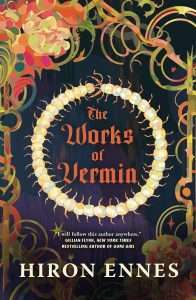 It’s hard to get across this book by describing the plot alone, but I’ll give it a shot. The city of Tiliard has been built out of the roots of a giant tree, whose roots lie in a vast toxic river. In the canopies, the city is pure decadence meets dystopian control; a city obsessed with art and excess while the secret police of the latest of the many despotic regimes eliminate any threats to its reign. In the roots, the workers strive to pay off their debts while giant insects produced by the river toxins are hunted by the city’s exterminators. One of these exterminators, Guy, is tasked with killing a new giant centipede who has a hunger for eating art and whose toxins begin to change the city in meaningful ways. Meanwhile, a woman who produces powerful toxin-based perfumes for the city’s marshal meets a mysterious gentleman from out of town whose secrets could change the city forever.
It’s hard to get across this book by describing the plot alone, but I’ll give it a shot. The city of Tiliard has been built out of the roots of a giant tree, whose roots lie in a vast toxic river. In the canopies, the city is pure decadence meets dystopian control; a city obsessed with art and excess while the secret police of the latest of the many despotic regimes eliminate any threats to its reign. In the roots, the workers strive to pay off their debts while giant insects produced by the river toxins are hunted by the city’s exterminators. One of these exterminators, Guy, is tasked with killing a new giant centipede who has a hunger for eating art and whose toxins begin to change the city in meaningful ways. Meanwhile, a woman who produces powerful toxin-based perfumes for the city’s marshal meets a mysterious gentleman from out of town whose secrets could change the city forever.
The ideas of The Works of Vermin are utterly wild and vivid. The toxins of the bizarre insects produced by the river are turned into perfumes that give gifts to the wearer: the ability to control people’s actions, or maybe just a more attractive smile. One of the most important roles of the city? The ruler’s scent-maker. The devastating building-deforming toxins used in previous intra-regime battles have changed entire areas of the city, and led to artistic movements. Then there’s the opera, where the killings on stage are very real, with those who displease the ruling chancellor being put to death to serve the cause of theatre.
Around these wild concepts, Ennes builds a story of deep satire, constantly hilariously yet deeply disturbing and utterly ruthless about what it says about the ruling classes. This is a city whose constant changes of authoritarian regime are named as art movements: from neo-revivalism to extemporism. The centrepiece for this art-obsessed city is the opera, where as I noted above revolutions are powered by stage performances that portray real killings. It’s this mix of the utterly pretentious with the shockingly brutal that powers some of the outrageous wit and whimsical grotesqueness of the satire, sort of if Waugh’s Vile Bodies was crossed with 1984.
This is all powered by Ennes’ frankly astonishing prose, already impressive in Leech, which seems to have undergone another metamorphosis in The Works of Vermin, like the monstrous centipede at the heart of the story. The result is that each page is laden with dense worldbuilding detail, creating a historical tapestry of absurd pastiche and vivid, gruesome detail on the horrific monstrosities that lurk in this world, the kind of detail that frankly will go over you head if you don’t devote the time to properly read this book, and if that sounds pretentious then perhaps I’ve been infected by the decadent spirit of Tiliard. Put it this way, it took me about four times my average to read a novel of this length. and I was devastated when it ended.
While pure satire is fun though, satire with heart is ultimately the most satisfying form of the genre and for all the tongue-in-cheek takes on the rulers, Ennes reserves deep wells of humanity for the city’s underclasses. Exterminator Guy’s attempts to create a future for his sister while surviving both their bosses and the monsters they hunt is incredibly poignant, especially when Ennes pulls off one of the greatest structural narrative reveals of modern fiction, which takes their story to new heights. I cannot emphasise enough how impressive this plot twist was: my moment of realisation of the inter-textual magic trick Ennes has done here was a book moment I will cherish forever. There is a strong undercurrent of compassion for the downtrodden yet hopeful underclasses of this book, and for all that the story is on one level a study of change—the giant centipede’s toxins literally change the city while the revolutionary movements around them change its political destiny—Ennes really seems to be suggesting that this is illusory change: hello new boss, same as the old boss, and the actual change lies in the stories of the workers’ attempts to escape their rule: whether the vermin can free themselves of the eternal plans of their pest-controlling masters. Alongside this is a deep theme of personal change: one trans character’s identify is, while never overtly discussed, nevertheless crucial to the plot, and gender fluidity flows through the city of Tiliard just as much as its river toxins.
Filled with some of the most twisted, inventive worldbuilding you’ll ever see and a perfectly poised balance of ruthless mockery of the decadent and corrupt with a well of deep humanity for those beneath them, The Works of Vermin is not just a landmark novel of dystopian satire but one of the great speculative works of the twenty-first century.
Read The Works of Vermin by Hiron EnnesThe post REVIEW: The Works of Vermin by Hiron Ennes appeared first on Grimdark Magazine.
EXCLUSIVE: Cover Reveal for Dogged by Michael R. Fletcher
Back in January of 2024 the good folks and Grimdark Magazine published a short story I wrote called The Last Wardog. When magazine editor Beth grumbled something about wanting a wardog novel I knew I had to write it. With my usual lack of forethought, planning, and whatever the other things people are supposed to do to manage large projects and build a career, I threw myself into writing. Dogged was a joke title, a place holder so I had something to call it until I figured out an actual proper name. Obviously, that never happened. Dogged is the perfect title for this fluffy-eared romp through the world of the Obsidian Path.
Being a bear of little brain, at some point I got distracted by a shiny new idea and decided that what I should really be writing is the final Obsidian Path novel. And so, I set Dogged aside and wrote The Lord of the Empty Mirror. When I finished the first draft of that project, I decided I wanted a break before diving into the edits and rewrites. I’d been world-building several novels in my spare time (epic SF, real-world horror, and perhaps a sequel to Dust of the Dead) and was having difficulty deciding which to write next. At some point I stumbled across a folder labelled Dogged and thought, ‘What the fuck is that?’ When I looked inside, I discovered half a novel!
Did I mention being a bear of little brain?
I read the half novel to see if it was any good and once again fell in love with wardogs. And so, I commissioned a cover, and decided to bring this story to life. And here it is, in all its glory.
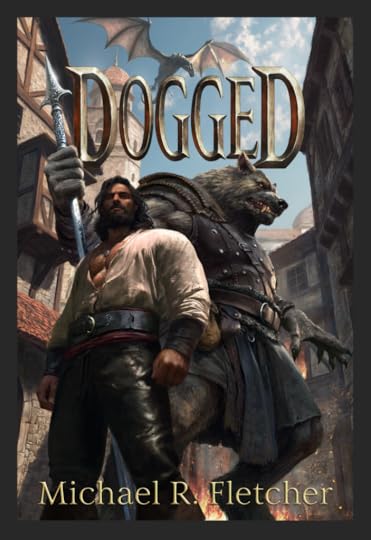
In the meantime, it turns out Adrian had his own plans for The Last Wardog, and has just released a YouTube version of the short story narrated by Colin Mace (Slow Horses, Those About to Die). I love it; check it out over on YouTube here!
A Quick Word About the ArtistI am always stalking new artists on Artstation. I love finding different styles and the search for exactly the right fit for a book is almost as fun as seeing the final product manifest in the real world. I stumbled across Tomasz Ryger while searching for artists with a flair for monsters. I have no doubt you are going to see a lot more of his work in the near future.
About Dogged by Michael R. FletcherWARDOGS ARE BORN TO DIE.
In the final days of the Demon Empire a lone wardog goes in search of the answer to the only question she cares about: Who murdered her mate?
Utterly unqualified to solve a mystery, Dogged Determination does have two advantages: She knows how to follow a trail, and she never, ever gives up.
From the heart of a massive empire to the deepest foreboding jungles, Dogged is an unstoppable force of will.
RELEASE DATE: December 15, 2025
Read Dogged by Michael R. FletcherFinding Fletch:Facebook: https://www.facebook.com/MichaelRFletcherX: @FletcherMRInsta: https://www.instagram.com/fletcher_michael_r/Bluesky: @michaelrfletcher.bsky.socialPatreon: https://www.patreon.com/michaelrfletcherYoutube: https://www.youtube.com/@mikefletcher5465The post EXCLUSIVE: Cover Reveal for Dogged by Michael R. Fletcher appeared first on Grimdark Magazine.
November 18, 2025
REVIEW: The Lost Reliquary by Lyndsay Ely
The Lost Reliquary was my first experience of reading Lyndsay Ely, but I don’t think it shall be my last. This is the dark fantasy story of Lys, a divinely blessed warrior who has sworn to kill the last living goddess. A goddess that Lys happens to be sworn to serve. I was certainly intrigued by this synopsis, and adding to those comparisons to Godkiller and Gideon the Ninth, and a cover featuring a sickle-wielding warrior, it seemed to have all the signs of being a book that a fan of darker fantasy would enjoy.
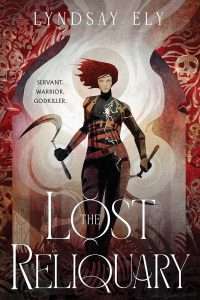 Once, the Devoted Lands were home to many gods. Now there is only one, Tempestra-Innara, the Eternal Flame. Lys was conscripted into service as a child, and to look at her, one would think she is a devoted servant of the goddess. But she is not. Lys harbours a very secret but incredibly strong desire to murder the goddess she serves. After a heretical assassination attempt nearly succeeds, Lys is sent on a secret mission with Nolan, a potentiate from a rival cloister, to recover a lost reliquary, filled with the divine blood of a fallen god. Nolan is a true believer of their goddess, devout and pious; he sees this mission as his chance to shine. Lys, however, believes it to be the only chance she will have to get her hands on a weapon that will finally be able to kill the goddess. She must feign devotion and loyalty to their cause, as they pursue a dangerous network of heretics linked to the assassination attempt, and search for the lost reliquary.
Once, the Devoted Lands were home to many gods. Now there is only one, Tempestra-Innara, the Eternal Flame. Lys was conscripted into service as a child, and to look at her, one would think she is a devoted servant of the goddess. But she is not. Lys harbours a very secret but incredibly strong desire to murder the goddess she serves. After a heretical assassination attempt nearly succeeds, Lys is sent on a secret mission with Nolan, a potentiate from a rival cloister, to recover a lost reliquary, filled with the divine blood of a fallen god. Nolan is a true believer of their goddess, devout and pious; he sees this mission as his chance to shine. Lys, however, believes it to be the only chance she will have to get her hands on a weapon that will finally be able to kill the goddess. She must feign devotion and loyalty to their cause, as they pursue a dangerous network of heretics linked to the assassination attempt, and search for the lost reliquary.
It is the snarky attitude to our main character, Lys, that gives The Lost Reliquary cause to be compared to Gideon the Ninth, so don’t pick this up expecting it to be a gothic sapphic space opera. In a segue from most fantasy now, The Lost Reliquary is devoid of a romantic subplot of any flavour. Which actually made for a pleasant reading departure. There is only one bed? I didn’t for a moment think that Nolan and Lys were about to become more intimately acquainted. Frankly, I spent most of the book thinking one of them was quite likely to kill the other.
There are also dark things aplenty going on, so there is a heck of a lot of appeal to grimdark fans. Drug dealers where the drugs are rendered human body parts? Check. Firey execution happening in the first chapter? Check. Mass murder? Check? Betrayal? Dubious morality all over the place? Check and check. The Lost Reliquary isn’t a formulaic or predictable read, but it is the sum of many good dark fantasy parts, and that should make it work for a lot of readers.
Overall, it was a good read. I wouldn’t say I was gripped from the get-go, but I was interested in the plot, the characters, and the outcome of the mission. Had the middle part of the story been a bit faster, I might feel differently, but the climactic finale did make up for that for me. I’m still on the fence about Ely’s world-building. There was a lot of detail about the structure of the cloisters and religious orders early on, which initially felt quite overwhelming, but not much else as the story progresses. Now this may be deliberate because Lys has spent most of her life sequestered in a religious order; she knows the details of that place very well, but is woefully unaware of other places. However I would have preferred to have learnt more about their world as I read.
The Lost Reliquary has a very satisfying ending, and Ely has left it on a cliffhanger, so I presume that the second novel in the series will pick up where this one leaves off. I’m invested enough to carry on with it, with the hopes that the pacing may tighten up a little now that the story is established.
Thank you to Lyndsay Ely and our friends at Saga Press for sending over a review copy of The Lost Reliquary.
Read The Lost Reliquary by Lyndsay ElyThe post REVIEW: The Lost Reliquary by Lyndsay Ely appeared first on Grimdark Magazine.
November 17, 2025
REVIEW: The Long Way Down by Craig Schaefer
The Long Way Day by Craig Schaefer is the first of the Daniel Faust books. A neo-noir urban fantasy series, Daniel Faust is very similar to the early Harry Dresden books with all of their horrific murders and black magic. Daniel isn’t a private detective, though he does do a lot of occult investigation. No, instead, Daniel is a hitman with a code. If you have been hideously wronged and the law cannot help, then he is willing to make your perpetrator suffer in such a way that death is probably the least of their worries.
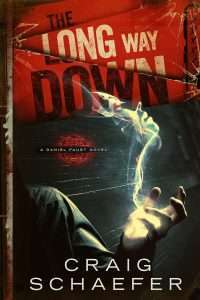 The premise for The Long Way Day gives you a good sense of how dark the books get and what sort of stories are being told: a porn star is murdered under suspicious circumstances in Las Vegas before being stuffed in a drainpipe. The victim’s father comes to Daniel seeking revenge as the police prove unwilling to do anything than label it an accident. Daniel proceeds to unravel the black magic involved as well as inflicting the maximum amount of horrifying damage he can to the guilty parties involved.
The premise for The Long Way Day gives you a good sense of how dark the books get and what sort of stories are being told: a porn star is murdered under suspicious circumstances in Las Vegas before being stuffed in a drainpipe. The victim’s father comes to Daniel seeking revenge as the police prove unwilling to do anything than label it an accident. Daniel proceeds to unravel the black magic involved as well as inflicting the maximum amount of horrifying damage he can to the guilty parties involved.
If I were to describe the series, I would go with the Dresden Files by way of LA Confidential. I’m a big fan of the latter and think that Craig Schaefer manages to capture the appropriate mixture of the grotesque with the cultured that it never becomes gratuitous. The Long Way Down manages to capture the spirit of Las Vegas and amp up the darkness contrasted to the neon glow. On one end, we have the dirty grimy criminal element, and the other has the literal forces of Hell. James Ellroy would be proud.
I really enjoyed the main character of Daniel Faust, who manages to be simultaneously likable but also guilty of numerous crimes. In a genre full of wise-cracking badasses, Daniel is extremely serious and devoted to his moral code. However, it’s a moral code that can at best be described as “flexible” what with being the hit man for hire that he is as well as the fact he willingly consorts with the very nasty forces of Hell.
I also give props to the character of Caitlin. A succubus who is enthusiastically a servant of Hell and capable of horrific acts of torture, she’s the second most likable character in The Long Way Down. She’s the kind of antihero that, alongside Daniel, makes this the kind of book that grimdark fans would enjoy. There’s a lot of excellent romantic tension, but it is the kind that I like: when you’re not sure one of the people involved will murder the other or not.
The Long Way Down is the first of a multibook series and much is set up in this volume versus being resolved as a standalone. I must give this book a lot of props, though. Craig Schaefer creates a very intricate underground community for supernaturals in his world as well as a coherent mythology. If you’re looking for an R-rated urban fantasy or occult detective series, then this is a solid place to start.
Read The Long Way Down by Craig SchaeferThe post REVIEW: The Long Way Down by Craig Schaefer appeared first on Grimdark Magazine.
November 16, 2025
REVIEW: The Witcher Season 4
It was a strange experience going into The Witcher S4. The books and games have always been great and I enjoyed the first few seasons, even if I felt it was nowhere near hitting the potential it had. On top of this, leading star Henry Cavill left the series to be replaced by Liam Hemsworth and those on the internet certainly had their opinions. Blocking out the noise, I dived into The Witcher S4 and found myself pleasantly surprised…
 The Witcher S4 starts off where the last season left off. There are three strands being followed: Geralt searching for Ciri as he believes her to be with the Emhyr who wishes to marry her and ensure a powerful bloodline, Yennefer is building an army to defeat the villainous Vilgefortz, and Ciri is living a separate life away with a band of misfits named The Rats. The writing and structure of the series has always been a bit messy – but I have to say I found this season more streamlined and easier to follow. The writing felt stronger although it still made me cringe in places with some dreadful lines somehow making it through the editing process (“School’s out!” – seriously?).
The Witcher S4 starts off where the last season left off. There are three strands being followed: Geralt searching for Ciri as he believes her to be with the Emhyr who wishes to marry her and ensure a powerful bloodline, Yennefer is building an army to defeat the villainous Vilgefortz, and Ciri is living a separate life away with a band of misfits named The Rats. The writing and structure of the series has always been a bit messy – but I have to say I found this season more streamlined and easier to follow. The writing felt stronger although it still made me cringe in places with some dreadful lines somehow making it through the editing process (“School’s out!” – seriously?).
People are going to have their opinions on Cavill being replaced by Hemsworth and it did take me an episode or two to get used to the change but for me, Hemsworth does well and his story this season is a strength. Geralt feels more human in this season and it suits Hemsworth. He makes friendships along the way as he cuts through monsters and deals with monstrous men. He makes friends with dwarves, gnomes, and an absolutely brilliant vampire (my favourite character!) and the dialogue between him and Jaskier always made me smile. Episode 5 of The Witcher S4 is one of the best that the Netflix show has put together with the friends sharing tales of their past and bringing something unique to the series. It was an episode that definitely reminded me of playing the game and that is a huge positive.
Yennefer’s story is another strength of The Witcher S4. Like Geralt’s thread, its strength is in its simplicity. Yennefer wants Ciri back and revenge on Vilgefortz. United mages, she works to bring down Vilgefortz with the power of mages old and new and it leads up to a huge magic battle with some brutal deaths that fans of grimdark will certainly enjoy. The main negative for me this season (other than some weak writing) is Ciri’s story. I’ve never been a fan of a young character getting lost and finding a young band of misfits who harp on about being free (see Stranger Things and a weird plot with Seven in season 2). The Rats, for me, were just annoying and when they were in any sense of danger I found myself hoping they would lose and never return to my screen. Thankfully, Ciri herself is still awesome – she’s an ass-kicking heroine and her fight scenes are always quality. However, there is another character that takes the spotlight for fights later in the season. Leo Bonhart. Leo is a bounty hunter who thrives on hunting witchers. Played brilliantly by the always amazing Sharlto Copley (District 9, Elysium, Oldboy), the bounty hunter is a grimdark nightmare. He is sadistic to the extreme and a character that people will love to hate and he has some of the best scenes in the series.
Despite the online backlash to casting choices, The Witcher S4 is a surprisingly streamlined, action-packed adventure that left me wanting more. With simpler stories, well-rounded characters, and a love of brutality, this season might actually be my favourite. Some fans will still hate it and I get that, but with a more human titular character, a badass sorceress, a delightful vampire, and one of the best villains on TV this year, The Witcher S4 is a fun grimdark adventure.
The post REVIEW: The Witcher Season 4 appeared first on Grimdark Magazine.
November 15, 2025
Colin Mace brings Michael R. Fletcher’s morose The Last Wardog to life on YouTube
When Michael R. Fletcher’s The Last Wardog was released in issue #37, I heard the morose howls of readers as they read this sad story of the dying war dog, The Darkest Shade of Grey, and his Packmaster, Ahira. On the losing side of a brutal siege, they try to protect their people in a final stand.
As soon as I found out Colin Mace (Slow Horses, Before We Die, Savage Hunt) had agreed to perform a short story for us for our YouTube Channel project, I knew this was the right story for his voice. He really nails the morose aspect of The Last Wardog, where we see the world through the lens of a wardog–a massive and extremely loyal pack warrior.
If you’re a dog person, this story is going to break you a bit. But don’t take my word for it, go find out using the player below, or by heading over to our YouTube channel.
More about the Grimdark Magazine YouTube ProjectIf this is the first time you’re hearing about our new YouTube project, then let me catch you up. At the start of this year, we made the decision to do something different to the rest of BookTube. We wiped all of our content–including interviews with Brandon Sanderson, Steven Erikson, and Patrick Rothfuss, among many others–and went down a new path.
We started hiring out podcast studios and camera crews and asked screen actors to bring these stories to life on screen with a live narration. The Last Wardog is our third video posted, and we have a fourth in editing which will go live before the end of 2025.
For us, this is a massive endeavor to keep driving attention to short stories and their brilliant authors, to bring them into the limelight in a different way. If this seems pretty cool to you, and you’d like to see more stories narrated by more actors, then we need your support.
Please go watch some of the videos, and then hit subscribe. Go to the Grimdark Magazine YouTube channel.
The post Colin Mace brings Michael R. Fletcher’s morose The Last Wardog to life on YouTube appeared first on Grimdark Magazine.
November 14, 2025
REVIEW: ALPHA by K.D. Marchesi
Pitched as ‘if Animorphs were spliced with Orphan Black and The Hunger Games’, ALPHA by K.D. Marchesi is a brutal survival sci-fi thriller with dangerously sharp teeth but a surprisingly warm, human heart. I mean, it’s got lots of genetic fuckery and scary shape-shifting horrors, but then it also offers some of the most heartwarming found family vibes and profound emotional journeys, and I absolutely love it for that. 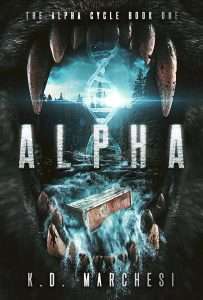 ALPHA is one of those books that just sinks its teeth into you from the very first page and refuses to let go. We are thrown into the life of Caleb Murilo, a slightly spoiled but good-hearted young guy who wakes up on an isolated island in a body that feels increasingly monstrous to him and then has to learn how to survive amidst a group of unlikely allies who are all victims of his dad’s sick and dangerously ambitious experiment. And if that isn’t a strong hook, then I don’t know what is.
ALPHA is one of those books that just sinks its teeth into you from the very first page and refuses to let go. We are thrown into the life of Caleb Murilo, a slightly spoiled but good-hearted young guy who wakes up on an isolated island in a body that feels increasingly monstrous to him and then has to learn how to survive amidst a group of unlikely allies who are all victims of his dad’s sick and dangerously ambitious experiment. And if that isn’t a strong hook, then I don’t know what is.
There are many, many things I love about ALPHA, but the thing I appreciate most about it is the fact that it’s so much more than just the thrilling survival adventure that it appears to be at first glance. Even without having read the raw, vulnerable author’s note in which Marchesi shares so bravely about how his personal transition journey is woven into the DNA of this book, you can tell that this story just comes straight from the heart. It’s queer down to its very bones without ever being overt in its themes and messages, and I think that only makes this story all the more powerful.
Like, you can totally come to ALPHA for the thrilling action, the gripping mysteries or the brutal body horrors, but I personally think those aspects only feel so gripping because the character work is so strong. Despite the fast pacing, Marchesi manages to get you deeply invested in these characters’ harrowing journeys by masterfully interweaving the internal and external conflicts, and I just had the best time seeing Caleb being an utter chaotic mess while trying to deal with all his inner turmoil as he attempts to figure out the mysteries of the island, its untrustworthy inhabitants, and his wildly changing body.
He is one of those main characters with a very strong voice and an even stronger will, which gets his impulsive, stubborn ass into some difficult yet undeniably amusing situations. And sure, at times he might come off a bit immature for his early 20s or the dialogue might feel a bit simple, but I think it fits with the new adult thriller vibe of the story. Also, I just can’t deny that I found Caleb to be effortlessly endearing, and it’s no surprise to me that he won the hearts of so many people on the island, even if they were reluctant to admit it at first.
The unexpected found family vibes are just so strong, with my favourite relationships being the precious lone (but not really lone) wolf/cub dynamic with Ethan, the touching mom-feels with my sapphic queens Ava & Aiel, the head-butting with Delia, and the simmering tension and teasing banter between Caleb and my snarky babe Argo (like, am I the only one who wants them to just kiss already?!?!). Especially when we start to peel back the layers of Caleb’s tragic family situation, childhood trauma, and daddy issues (who easily wins worst dad of the year award, no competition), it only becomes more touching to see him finding his own pack to support and comfort him in ways he never knew he needed.
ALPHA might be a brutal and heavy story, but it never feels emotionally draining because of the heart, (dark) humour, and hope that lie at its core. It does everything a good start to a new series should do, and I can’t wait to see what Marchesi has in store in the rest of The Alpha Cycle. It’s a wildly unique tale of self-discovery, of transition, of queerness, of community, of found family, of exploitation, and of rebellion, and I can’t recommend it highly enough to anyone who likes the sound of a fast-paced survival sci-fi that is as monstrous as it is human.
Thank you to the author for providing me with an eARC in exchange for an honest review. All opinions are my own. ALPHA is scheduled for release on November 20th, 2025.
The post REVIEW: ALPHA by K.D. Marchesi appeared first on Grimdark Magazine.
November 13, 2025
INTERVIEW: with author Eric Malikyte
Eric Malikyte is the author of several of our favorite Cthulhu and cyberpunk novels. We recently enjoyed his latest occult horror novel, Cthulhu: Grimoire and jumped at the chance to sit down and chat with him more about Cthulhu: Grimoire, the Cthulhu mythos in general, and what is up next in the world of Eric Malikyte.
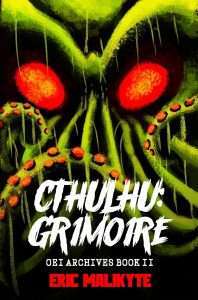 [GdM] Hi Eric! Thank you so much for agreeing to chat with us. For readers who may not know, can you tell us a little more about
Cthulhu: Grimoire
?
[GdM] Hi Eric! Thank you so much for agreeing to chat with us. For readers who may not know, can you tell us a little more about
Cthulhu: Grimoire
?
[EM] Cthulhu: Grimoire is a detective noir cosmic horror story that uses the trappings of both genres, plus some influences from other horror movements like analog horror, to ask the all-important question of…what would happen if Cthulhu got His hands on an AI, and how might that effect the already messed up world we live in?
It takes place in Los Angeles and the San Bernardino Valley right in the middle of a forest fire that paints everything in this sickly yellowish tone that gradually transforms as the cosmic horror unravels into a nightmare-scape that would make H.R. Giger proud.
[GdM] What separates Cthulhu Grimoire from other examples of the Cthulhu mythos and horror fiction?
[EM] One thing I set out to do while writing Cthulhu: Grimoire was to take advantage of Cthulhu’s status as a public domain entity and really have fun with it. I’ve felt for a while that a lot of Lovecraftian horror feels like it’s got to honor the “canon” established by Lovecraft and his contemporaries. But part of the fun of a public domain IP like the Mythos is that it doesn’t have a set continuity.
I love continuity and canon, but I feel like storytellers also must know when to let go of canon to do something new and fun (or in this case, new and terrifying). Where a lot of other amazing cosmic horror authors will create their own Lovecraftian entities and grimoires (I do this too), I wanted to take something familiar and transform it, while keeping to the elements that make Cthulhu and the Shoggoths so iconic.
There’s something really cool about getting to play with a character as big as Cthulhu. And I really wanted to focus on making Him as terrifying as possible, to really lean into the subjective nature of his form, the idea that Cthulhu isn’t a physical being, that he’s both there and not there at the same time. Alive and dead. Dead and dreaming. I really wanted to lean into the idea that we don’t know what Cthulhu really looks like, that we project our assumptions on an unknowable entity.
[GdM] Is this a standalone project or does it link to some of your other works?
[EM] It can be enjoyed as a standalone, but it is a sequel. Readers do not have to have read Mind’s Horizon (the first book featuring the mad Doctor Weber/Webber and the OEI) to enjoy Cthulhu: Grimoire but reading the first book will give them additional context to a certain character and her relationship to this world’s version of Doctor Webber.
All OEI Archives stories will be designed to be standalone stories, but they will still be connected, either by continuity in the form of the characters who made it out of Mind’s Horizon, or by OEI lore, but they are all being written so that they can be read in any order. In that way, it’s an anthology series.
[GdM] Can you pitch its plot in thirty seconds or less?
While investigating a series of suicides at a for-profit art school, Detective Hunter and his unlikely ally, art student River Gonzales, stumble upon a computer virus that is driving people mad. All it takes is a single glance for it to fill your mind and bend you to its will.
Detective Hunter and River must find a way to break the virus’ hold on the San Bernardino Valley and stop a looming apocalypse.
But with the shadowy hand of a secret government agency and one Doctor Webber looming over them, can they?
[GdM] Who is the main character? River or Hunter?
[EM] This story is just as much about River as it is Detective Hunter. They get equal “screen time” if you will, and their partnership and unlikely friendship is what drives the book.
[GdM] What draws you to writing set in the Cthulhu Mythos?
[EM] I mean, there’s so much to it. It’s so much more than the tentacle monsters, though those are unique among other horror genres.
Cosmic horror as a genre is one of the few that doesn’t treat humanity like it’s the greatest thing since sliced bread and dares to unravel our assumption that we are the center of everything. But, even though he was a raving racist, there is just something so unique and fun about Lovecraft’s creations. I mean, there’s a reason why Cthulhu is everywhere (I mean, he’s a freaking plushy now…and now I just realized I don’t have a Cthulhu plushy, and I probably need to fix that), and even people who have never read a single Mythos story know who he is.
But, also, despite Lovecraft’s reputation for having less than developed characters, the Mythos offers atmospheric storytelling that can, at times, make you feel like you’re spiraling into madness right alongside the narrator, and that’s pretty cool, I guess.
[GdM] Is it hard writing Cthulhu Mythos fiction set in the modern day?
[EM] Not really. There’s a subset of Lovecraftian horror fans that think it only works in the 1920s and 30s, but really, I think that’s a bit of a literal approach. While the universe certainly looked a lot smaller in Lovecraft’s day, and the sciences were just getting started, there’s still so much of this universe that we don’t understand. There is no theory of everything, so it’s not all that hard for us to worry that the unfeeling cosmos might be hiding some cosmic force of nature that could wipe us out in the blink of an eye.
I’ve done a lot of science communication as part of my professional writing career, but simultaneously I’ve had many strange experiences in my life. Things I can’t explain. As a child, I saw the Hat Man lurking at the sliding glass door of my childhood home, I’ve felt the presence of things watching from the dark in many of the places I grew up, heard disembodied footsteps in many places that were described as “haunted” both during my time growing up in So Cal, and on the East Coast. I’ve experienced so many things that I can’t explain. And that’s part of the fun, right? We have so many mysteries to unravel as a species.
Personally, cosmic horror is a very young genre, and there’s so much potential for stories set in all kinds of eras. I mean, I’ve got a bunch of Call of Cthulhu scenario books that take place all over different time periods and they all offer something unique.
 Author Eric Malikyte
Author Eric Malikyte[GdM] What makes the Mythos scary in this book?
[EM] I think it’s the idea that you can wake up one day and the people you thought you knew so well, whether they are family, friends, or spouses—people you love dearly—are suddenly be gone, absorbed into a cult. That there are people who have been lured into cults and have been transformed into worse versions of themselves. I think that’s something that people can really relate to, and it’s terrifying, because it’s real.
[GdM] The book has a strong political context. Is that a good thing or a bad thing for a writer in 2025?
[EM] All the best stories are political in some way. Fahrenheit 451 by Ray Bradbury is about a fascist regime in America that burns books to prevent the proletariat from becoming too educated.
1984 is terrifying and iconic.
Cyberpunk as a genre is intensely anti-corporate and political.
Robocop is one of the most iconic dystopian science fiction movies of all time and it’s one of the most anti-corporate things ever made.
Alien centers around a bunch of working-class space truckers who are inevitably determined to be expendable by their employer.
Even something like the Cthulhu Mythos is political. The idea that humanity’s obsession with exploring the unknown could one day cause its own destruction asks whether science as a whole is a double-edged sword?
Like it or not, politics shapes our world, and your personal politics shapes your world view. To quote the legendary progressive rock band, Rush, “If you choose not to decide, You still have made a choice.”
There’s also an argument that this obsession we have in the West of remaining “non-political” has done a greater harm than good. Did our complacency and focus on civility politics only pave the way for the return of fascism? That’s a question we as a society and species have to ask ourselves for the sake of the world our children and their children will have to grow up in.
[GdM] Other than Cthulhu: Grimoire, what are some of your other works that our readers could go and find?
[EM] Obviously, there’s Mind’s Horizon, which is the precursor and the blueprint for the OEI Archives series. There’s the OEI Files series which is a great entry point into the OEI multiverse, the first of which is free everywhere ebooks are sold (It’s called In Its Shadow, by the way).
There’s Echoes of Olympus Mons, which is a fusion of cyberpunk and cosmic horror. I’m working on two sequels to it that will expand the horrors the Corporate Confederacy is capable of committing.
And the Ego Trip is the first book in the Neo Rackham series, set about 60 years after Echoes of Olympus Mons. I’ll have two sequels to Ego Trip coming out next year in Bad Omens, and a 3rd book that needs to be titled.
Then there’s Suleniar’s Enigma books 1 and 2. It’s a combo of dark fantasy, Lovecraftian horror, that was heavily inspired by shonen battle manga, off the wall JRPGs like Chrono Trigger, Tales of Symphonia, and Roger Zelazny’s Chronicles of Amber series. I’m still drafting the third book and mapping out books 4 and 5.
[GdM] The world of the indie writer seems to differ greatly from author to author. How has your experience as an indie author been so far?
[EM] I’ve apparently been authoring on “hard mode” as some of my friends have suggested. By writing in so many different genres, it makes marketing things a bit challenging. Maybe it’s the ADHD, maybe I’m just crazy, but I can’t really help where my creative energy wants to go. My hope is that if readers really enjoy what I’m offering, if they see the quality of it, they’ll be curious to look outside their genre preferences. But who knows?
But the most important thing about any creative project is the passion and love of the artform, and that’s not going anywhere for me.
[GdM] Thank you so much for talking with us today Eric, hopefully you’ve enjoyed it as much as we have! One final question, what can we expect from you next?
[EM] Sequels to Ego Trip, Echoes of Olympus Mons, and Suleniar’s Enigma. I’m also working on drafting the next OEI Archives book, but it’s still in the early stages of writing and ideation.
I’m also working on a cyberpunk battle manga that serves as a loose sequel to Suleniar’s Enigma that will also have a tabletop RPG attached to it that is 90% done. The comic is also fairly far along in the creative process, but you can see some of the pages I’m working on on my Cara account.
Read Cthulhu: Grimoire by Eric MalikyteThe post INTERVIEW: with author Eric Malikyte appeared first on Grimdark Magazine.
November 12, 2025
REVIEW: To Clutch a Razor by Veronica Roth
To Clutch a Razor is Veronica Roth’s second entry in the Curse Bearer series and picks up not long after the end of When Among Crows. There might be some spoilers for the first book in this review, so proceed with caution if you have yet to finish book one. Dymitr has been separated from his bone sword, a weapon of the Holy Order formed from half his soul, and is beginning to suffer from it. Baba Jaga proposes a solution and it would involve Dymitr not only turning his back on his past but hurting those he loves.
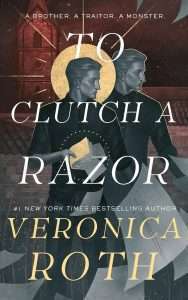 In an attempt to help Dymitr out of his impossible situation, Ala suggests he instead steals his family’s book of curses that he is sworn to keep and use it as a bargaining chip with the all-powerful witch. This sets in motion a return to his family home in Poland and a daring heist at his beloved uncle’s funeral, all while hoping nobody detects he is no longer a Knight.
In an attempt to help Dymitr out of his impossible situation, Ala suggests he instead steals his family’s book of curses that he is sworn to keep and use it as a bargaining chip with the all-powerful witch. This sets in motion a return to his family home in Poland and a daring heist at his beloved uncle’s funeral, all while hoping nobody detects he is no longer a Knight.
Back in Poland, Ala and Dymitr run into Niko, who is on a mission to kill a dangerous Knight known as the Razor. Exposing more of Dymitr’s secrets and past, Niko discovers the Razor is a close family member to his newly-monstrous, almost-boyfriend. To Clutch a Razor places these characters each into their own difficult circumstances where they’re forced to choose between their own needs and those of others.
To Clutch a Razor has an overall darker feel to it than When Among Crows, as it challenges the reader to consider whether we can continue to love someone knowing they’re a terrible person, and whether that makes us as culpable as them. The Knights we see are all too often cruel and heartless, even though we know they’ve been indoctrinated over centuries to believe the lies they shroud themselves in. Can that ever excuse the zealotry they bring to torturing others?
“Screaming is for the first moments of pain, the shocking ones, the ones that happen before pain is so layered over itself that there’s no energy left to scream.”
With When Among Crows, I felt some aspects were a little rushed and that has largely been rectified in To Clutch a Razor. There is still a lot of room to grow these characters and the book continues in the feel of an origin story. All the good aspects of the first book remain, as well as bringing in some greater depth to Dymitr and the history of the Holy Order. It is still novella-length and offers a short, punchy journey into shadowy folklore and dark dealings.
Read To Clutch a Razor by Veronica RothThe post REVIEW: To Clutch a Razor by Veronica Roth appeared first on Grimdark Magazine.



